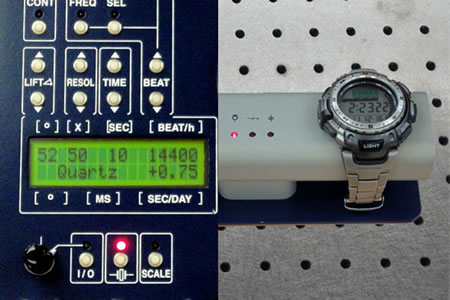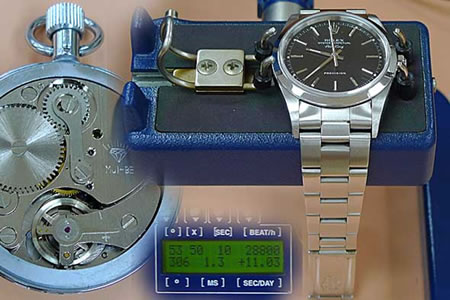Calibration Services
Time and Frequency: Mechanical and Quartz Watch Tester
Quartz Watch Tester
 Quartz Watch Tester
Quartz Watch Tester
Nearly every quartz watch contains a quartz crystal oscillator at nominal frequency of 32768 Hz as a frequency reference. Quartz watch testers are used by watches manufacturers, retailers or repair shops to check the accuracy of these frequency references. Quartz watch testers have ultrasound sensors to pick up the acoustic vibration from the oscillators. Quartz watch testers are essentially frequency counters that measure the accuracy of the quartz crystal oscillator.
The reading of a quartz watch tester is normally given in time error of seconds per day. The Laboratory offers calibration service for quartz watch testers by measuring the correction to the time error reading.
Mechanical Watch Tester
 Mechanical Watch Tester
Mechanical Watch Tester
Most mechanical watches use balance wheels as frequency references. The vibration frequency of balance wheel is traditionally measured in beats per hour (BPH). A beat refers to one swing of the balance wheel from one side to the other. Hence there are two beats in a cycle. Common mechanical watches have rates of 5 (18,000 BPH), 6 (21,600 BPH), 8 (28,800 BPH) or 10 beats per second (36,000 BPH).
Mechanical watch testers have acoustic sensors to pick up the acoustic vibration caused by swing of the balance wheel. Mechanical watch testers are essentially frequency counters that check the accuracy of the beat frequency of the balance wheel.
The reading of a mechanical watch tester is normally given in time error of seconds per day. The Laboratory offers calibration service for mechanical watch testers by measuring the correction to the time error reading.